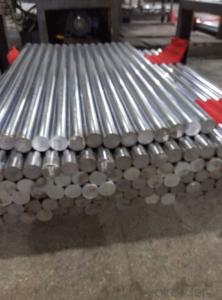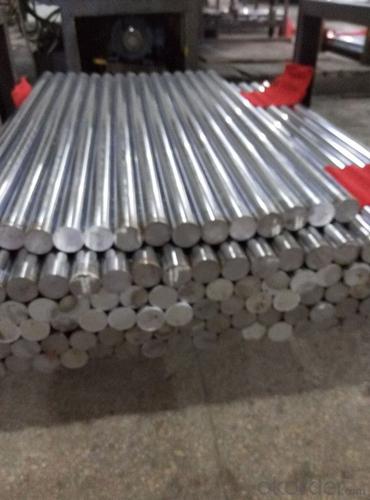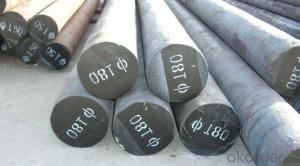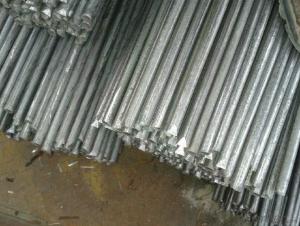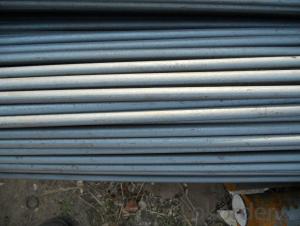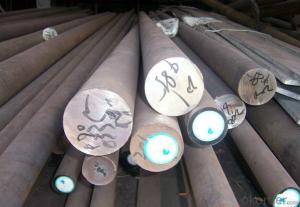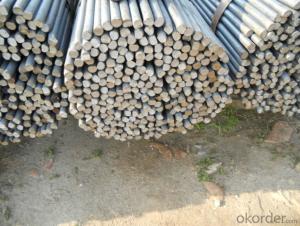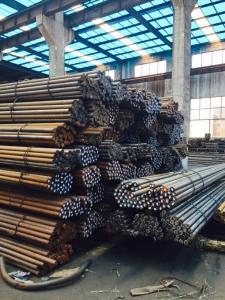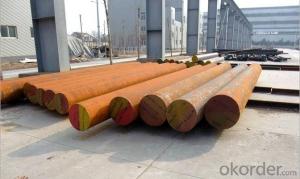S45C Round Bar Chromed Steel Round Bar-Steel Round Bar
- Loading Port:
- Tianjin
- Payment Terms:
- TT OR LC
- Min Order Qty:
- 25 m.t.
- Supply Capability:
- 50000 m.t./month
OKorder Service Pledge
OKorder Financial Service
You Might Also Like
Specification
S45C Round Bar Chromed Steel Round Bar-Steel Round Bar
Product Details:
1. Material: Alloy structural steels, carbon structure steels, alloy tool and model steels,etc.
2. Process: EAF + LF + VD + Forged + Heat Treatment (optional)
3. Delivery condition:Hot forged +Rough machined (black surface after Q/T)+ Turned (optional)
4.Technical Data: Chemical Composition, Physical Properties and Mechanical Testing.
5. Test: Ultrasonic test according to SEP 1921-84 3C/c.
Chemical Composition:
C | Si | Mn | P | S | Cr | |
45Cr | 0.42-0.49 | 0.17-0.37 | 0.6-0.9 | Max0.035 | Max0.035 | 0.3 0.4 |
S45C | 0.42-0.48 | 0.15-0.35 | 0.6-0.9 | Max0.030 | Max0.035 | |
1045 | 0.43-0.5 | 0.15-0.35 | 0.6-0.9 | Max0.030 | Max0.050 |
Application:
1 Can be used in many fields such as building, automobile, shipbuilding,
petrochemical, machinery, medicine, food, electric power, energy, space, building
and decoration, etc.
2 Can be made into mould template, mortise pin, column
3 This kind of steel have good mechanical property, is widely used in structural parts
4 which may support stress alternation, especially made into some connecting
rods, bolts, wheel gear...
5 This kind of steel is the most common blanks and materials of shaft part
Product Show:
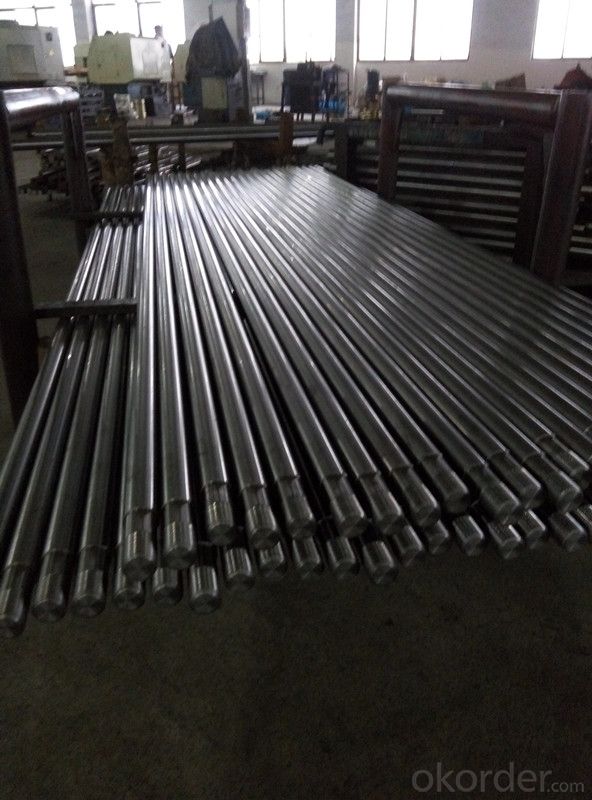
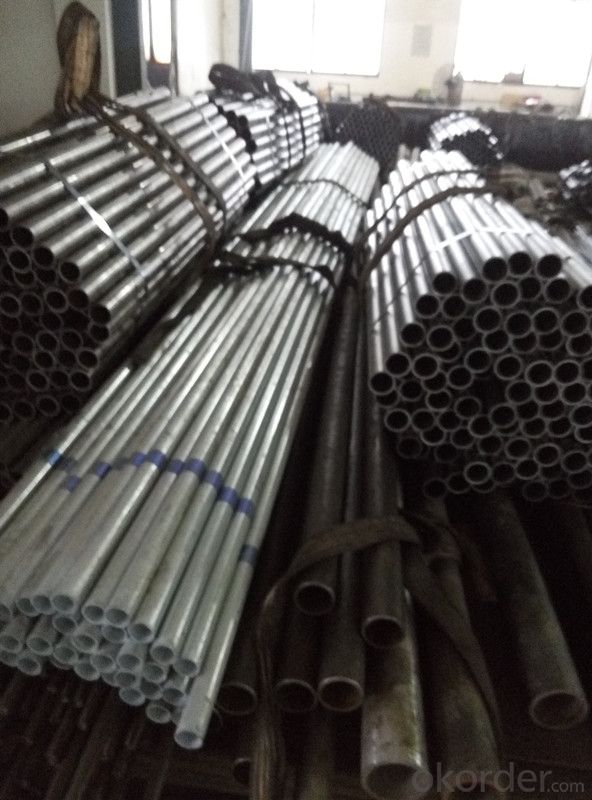
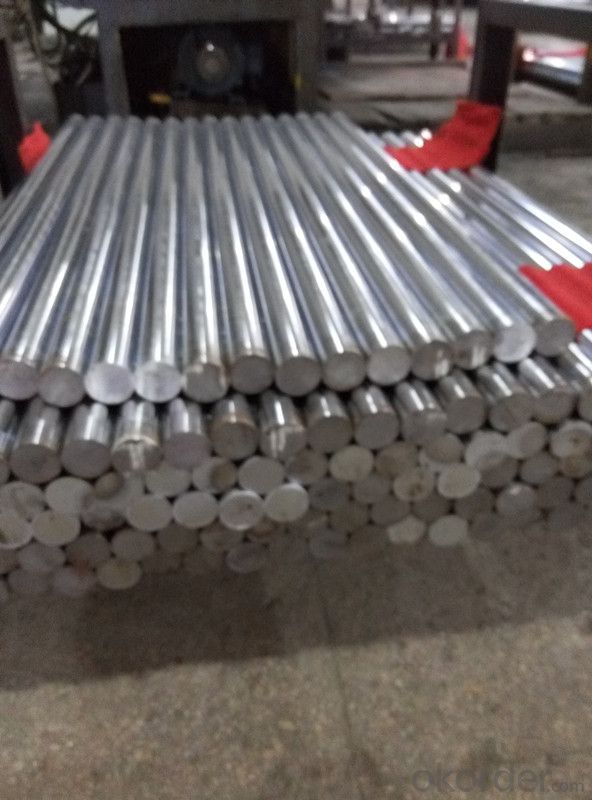
- Q: How does special steel perform in extreme environments?
- Special steel is specifically designed to perform exceptionally well in extreme environments. It exhibits high resistance to corrosion, oxidation, and temperature variations, making it suitable for applications in harsh conditions such as marine, aerospace, and power industries. Additionally, special steel offers superior strength, toughness, and durability, enabling it to withstand extreme pressures, impacts, and environmental stressors without compromising its performance.
- Q: How does special steel contribute to the machinability of products?
- The role of special steel in enhancing product machinability is substantial. Machinability refers to a material's ease of being cut, drilled, or shaped through various machining processes. Special steel, also known as alloy steel, is formulated with specific elements that improve its machinability. One vital aspect of special steel that enhances its machinability is its composition. By incorporating elements like manganese, sulfur, and phosphorus, special steel achieves superior machinability compared to regular carbon steel. These elements reduce friction during machining, resulting in less tool wear and longer tool lifespan. Additionally, they facilitate the formation of smaller, more manageable chips during cutting, making it easier to control the machining process and maintain dimensional accuracy. Furthermore, special steel often undergoes specific heat treatment processes like annealing or quenching and tempering to further enhance its machinability. Heat treatment improves the steel's microstructure, making it more uniform and refined, consequently improving its machinability characteristics. Heat-treated special steel exhibits improved hardness, toughness, and resistance to wear, all of which are crucial for achieving high-quality machined products. Moreover, special steel can be engineered to possess other desirable properties such as high strength, corrosion resistance, or heat resistance while still maintaining good machinability. This versatility allows manufacturers to select the most suitable special steel for their specific machining applications, ensuring optimal performance and productivity. In summary, special steel plays a significant role in product machinability due to its specific composition, heat treatment processes, and versatile properties. By utilizing special steel, manufacturers can achieve better machining performance, improved tool lifespan, and higher dimensional accuracy, ultimately resulting in superior quality products.
- Q: What are the advantages of using special steel in industrial applications?
- Special steel offers several advantages in industrial applications: 1. Durability: Special steel is known for its exceptional strength and hardness, making it highly resistant to wear and tear. This durability allows it to withstand extreme conditions, such as high temperatures or corrosive environments. 2. Versatility: Special steel can be tailored to meet specific requirements, allowing for the production of a wide range of products. It can be alloyed with other metals or elements to enhance its properties, making it suitable for various industrial applications. 3. High performance: Special steel exhibits superior mechanical properties, including high tensile strength, toughness, and impact resistance. These characteristics make it ideal for applications that demand reliability and performance, such as machinery, tools, and equipment. 4. Resistance to corrosion: Special steel can be manufactured with corrosion-resistant properties, offering protection against rust and deterioration over time. This makes it suitable for applications exposed to moisture, chemicals, or harsh weather conditions. 5. Cost-effectiveness: Although special steel may have a higher initial cost compared to other materials, its long lifespan and low maintenance requirements make it cost-effective in the long run. Its durability and resistance to wear reduce the need for frequent replacements or repairs, resulting in reduced downtime and overall operational costs. In summary, the advantages of using special steel in industrial applications include durability, versatility, high performance, resistance to corrosion, and cost-effectiveness.
- Q: What are the challenges in machining high-speed special steel?
- Several challenges arise when machining high-speed special steel due to its unique properties and characteristics. Its extreme hardness presents one of the main obstacles, making cutting and shaping difficult. High-speed special steel typically has a high carbon content and undergoes heat treatment to enhance its hardness, resulting in increased wear on cutting tools. The increased hardness of this steel also leads to elevated heat generation during the machining process. This heat can cause thermal distortion and impact the dimensional accuracy of the final product. To counteract this, specialized cooling techniques and cutting tools with advanced coatings must be used to dissipate heat and maintain stability. Another challenge is the brittleness of high-speed special steel. It tends to have low toughness and is susceptible to cracking and chipping during machining operations. To minimize the risk of tool failure and excessive stress, careful selection of cutting parameters such as cutting speed, feed rate, and depth of cut is necessary. Furthermore, high-speed special steel often contains alloying elements like tungsten, vanadium, and cobalt, which can further complicate the machining process. While these elements increase the strength and wear resistance of the steel, they also make it more challenging to machine. Effective machining of these alloys and achieving desired surface finishes requires specialized tool materials and cutting strategies. Additionally, the cost of high-speed special steel is often significantly higher than that of conventional steels, adding to the challenges of machining. The high tooling costs associated with the cutting tools required for machining this steel can be a substantial investment. Overall, machining high-speed special steel necessitates advanced cutting techniques, specialized tooling, and careful consideration of cutting parameters to overcome the challenges posed by its extreme hardness, brittleness, and alloying elements.
- Q: Can special steel be used in the nuclear industry?
- Yes, special steel can be used in the nuclear industry. Special steel is often chosen for its high strength, corrosion resistance, and ability to withstand extreme temperatures and radiation. It is commonly used in the construction of nuclear reactors, containment vessels, and fuel storage systems. The specific requirements and standards for special steel used in the nuclear industry are carefully regulated to ensure safety and reliability.
- Q: How is special steel used in the production of pressure vessels?
- Special steel is employed in the manufacturing of pressure vessels because of its distinctive characteristics that make it suitable for enduring high-pressure environments. Pressure vessels, which are containers designed to hold gases or liquids at a significantly different pressure than the surrounding atmosphere, frequently find application in industries such as oil and gas, chemical, and power generation. To guarantee the safety and dependability of these containers, the use of special steel in pressure vessel production is essential. Special steels, including carbon steels, stainless steels, and alloy steels, provide improved mechanical properties, high strength, and exceptional resistance to corrosion. These attributes are crucial for withstanding the extreme pressure conditions experienced by pressure vessels. One of the primary roles of special steel in pressure vessel production is to provide resistance against internal pressure. The steel must possess the ability to endure the force exerted by the vessel's contents without deforming or rupturing. Due to the high strength and toughness of special steels, they are capable of handling these pressures, thereby ensuring the vessel's integrity and preventing catastrophic failures. Additionally, special steel plays a vital role in preserving the structural integrity of pressure vessels. These vessels encounter various external loads, such as wind, seismic forces, and thermal expansion. The superior mechanical properties of special steel enable it to withstand these loads without significant deformation or failure, thereby ensuring the structural stability of the pressure vessel. Moreover, special steel's resistance to corrosion is crucial in pressure vessel production. Pressure vessels frequently contain corrosive substances, and the corrosive environment can lead to material degradation over time. Special steels, particularly stainless steels, offer excellent corrosion resistance, thus minimizing the risk of material deterioration and prolonging the vessel's lifespan. In conclusion, special steel is used in the production of pressure vessels due to its high strength, toughness, and corrosion resistance. These properties enable the steel to endure high-pressure conditions, maintain structural integrity, and prevent failures related to corrosion. By utilizing special steel, manufacturers of pressure vessels can ensure the safety, dependability, and longevity of these critical containers.
- Q: What are the different methods of heat treatment for special steel?
- Special steel can undergo various heat treatment methods, each designed to enhance specific properties. These methods are as follows: 1. Annealing: By heating the steel to a specific temperature and gradually cooling it, typically in a controlled atmosphere, annealing helps relieve internal stresses, improve machinability, and soften the steel for further processing. 2. Normalizing: This process involves heating the steel above its critical temperature and then air cooling it in still air. Normalizing refines the grain structure, improves mechanical properties, and enhances strength and toughness. 3. Quenching: By rapidly cooling the steel from a high temperature using quenching mediums like oil, water, or brine, quenching creates a hard and brittle structure called martensite. This increases the steel's hardness and wear resistance. 4. Tempering: After quenching, the steel is reheated to a specific temperature and held there for a certain period, followed by air cooling. Tempering reduces the brittleness caused by quenching, improving toughness, ductility, and impact resistance. 5. Austempering: This method involves quenching the steel from a high temperature and then holding it at a specific temperature for an extended period. Austempering produces a structure called bainite, which offers a combination of strength, toughness, and ductility. 6. Martempering: A variation of quenching, martempering involves cooling the steel just above its martensitic transformation range and holding it at that temperature until uniformly cooled. This method reduces the risk of distortion and cracking, providing improved toughness and dimensional stability. 7. Induction hardening: Specifically used to selectively harden certain areas of the steel's surface, induction hardening involves heating the surface using induction heating and rapidly quenching it. This process creates a hardened surface layer while maintaining core toughness and ductility. These diverse heat treatment methods for special steel offer a range of options to optimize desired properties depending on specific applications and requirements.
- Q: How is special steel used in the construction industry?
- Special steel is used in the construction industry for various purposes such as reinforcing concrete and providing structural support in high-rise buildings, bridges, and infrastructure projects. It is also used for manufacturing construction equipment, tools, and machinery due to its exceptional strength, durability, and resistance to corrosion.
- Q: What are the characteristics of special stainless steel?
- Special stainless steel, also known as superalloys, possess several unique characteristics. Firstly, they exhibit exceptional resistance to corrosion, making them highly durable and long-lasting in harsh environments. Additionally, they have high strength and toughness, allowing them to withstand extreme temperatures and pressures. Special stainless steel also demonstrates excellent heat resistance, making it suitable for applications in high-temperature environments. Furthermore, these alloys often exhibit superior chemical stability, resistance to wear and tear, and excellent mechanical properties, making them highly versatile for various industrial applications.
- Q: What are the different methods for nitriding special steel?
- There are several methods for nitriding special steel, including gas nitriding, salt bath nitriding, plasma nitriding, and ion nitriding.
Send your message to us
S45C Round Bar Chromed Steel Round Bar-Steel Round Bar
- Loading Port:
- Tianjin
- Payment Terms:
- TT OR LC
- Min Order Qty:
- 25 m.t.
- Supply Capability:
- 50000 m.t./month
OKorder Service Pledge
OKorder Financial Service
Similar products
Hot products
Hot Searches
Related keywords
